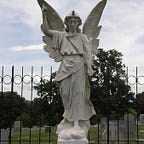The Ballads of Poor Ellen Smith
On July 20, 1892, Ellen Smith was fatally shot by Peter DeGraff near the Zinzendorf Hotel in Winston-Salem. The murder became the subject of a popular turn-of-the-century ballad, “Poor Ellen Smith,” which has survived in at least three different versions.
Ellen Smith
Ellen Smith was a maid in the home of a Winston-Salem merchant. She became pregnant while romantically involved with DeGraff, a local ladies’ man and ne’er-do-well. The child was stillborn or died after birth during a visit to Smith’s family in Yadkin County, allegedly accompanied by DeGraff, who denied that the child was his.
Peter DeGraff
DeGraff subsequently broke off the relationship and threatened to shoot Smith if she attempted to contact him. On July 17, the two had a major quarrel at the home of Smith’s employer. Ellen’s body was found on the morning following her death when individuals were directed to the site by a man who was apparently DeGraff himself. DeGraff soon fled and lived under an assumed name in Mt. Airy, but returned in June 1893 and was arrested. Although DeGraff pled innocence, the accumulated evidence at the trial pointed convincingly towards him as the killer. Convicted, DeGraff’s execution was held on February 8, 1894. There he confessed to the murder to the large crowd of onlookers.
Early versions of an Ellen Smith murder ballad used a tune similar or identical to that of the hymn “How Firm a Foundation.” Although lyrics varied from version to version, there were some lines which carried over, such as “Of poor Ellen Smith and how she was found / Shot through the heart [or ‘With a ball through her heart’] lying cold on the ground.” Folklorist Newman Ivey White in his multivolume anthology The Frank C. Brown Collection of North Carolina Folklore presented transcriptions of two versions, both written from the perspective of Peter DeGraff. In the first version, DeGraff protests his innocence, and hopes that the real culprit might be found; in the other, DeGraff admits his guilt. A transcription of the second of the versions in White can be found in Matthew Burns, “Poor Ellen Smith,” Appalachian Lifestyles blog. It is preceded by yet another version of the ballad, which is the variant that is most often used as the basis for recordings.
The popular folk act the Kingston Trio recorded a version of “Poor Ellen Smith” on their 1962 album New Frontier. Although credited to group members Nick Reynolds, Bob Shane, and John Stewart, the lyrics were excerpted and rearranged from one of extant ballads.
In the same year, Lester Flatt and Earl Scruggs recorded a bluegrass version of the Ellen Smith ballad for their album Folk Songs of Our Land.
A more recent recording was made by singer-songwriter Neko Case on her 2001 EP Canadian Amp.
These and many other renditions illustrate the continuing popularity of the Ellen Smith story as a recording subject.
